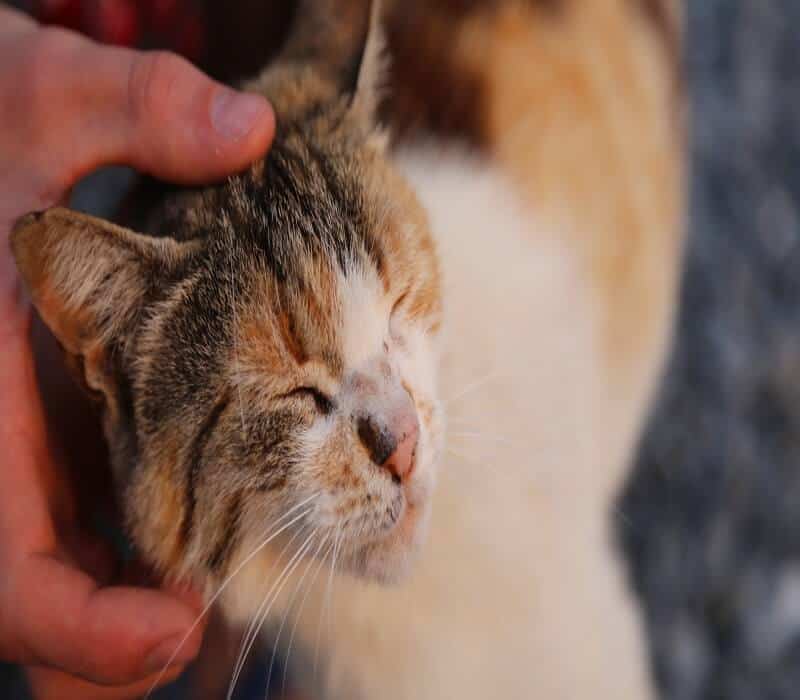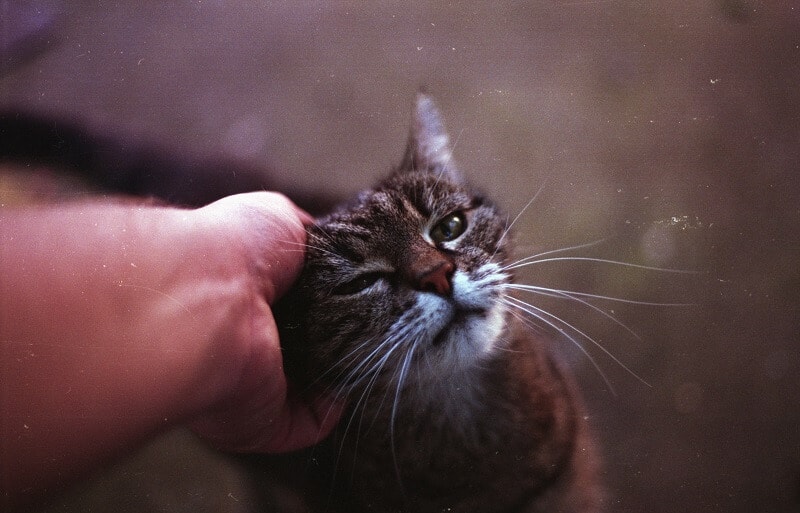Have you ever noticed that your cat seems to prefer a firm pat or massage rather than a gentle stroke? It turns out that there’s a biological reason behind this behavior!
Cats have sensory receptors that respond differently to various types of touch, and a firm pat can trigger pleasurable sensations that strengthen the bond between pet and owner.
In this article, we’ll explore why cats love firm pats, the physical and emotional benefits of petting, and the potential dangers of over-petting.
Domestic Cat’s Natural Behavior
Domestic cats have retained some of the natural behaviors and instincts that helped them survive in the wild. One such behavior is their liking for hard pats or massages, which can be traced back to their ancestral grooming habits. When a cat receives firm pats, it simulates the sensation of being groomed by another feline’s rough tongue. This not only helps keep their coat clean but also provides comfort and social bonding between individuals.
The Sensory Experience of Petting
Tactile Stimulation
Cats often prefer a firm pat rather than a gentle caress because of the tactile stimulation they receive. Cats have numerous nerve endings in their skin that respond differently to various types of touch. When we pat our cats firmly, we’re essentially activating these specific nerve endings, giving them a pleasurable experience that strengthens the bond between pet and owner.
Relaxation and Endorphin Release
When we stroke our cats’ fur or give them a firm pat, their bodies release endorphins – the ‘feel-good’ hormones that help both humans and animals relax and unwind. These natural chemicals contribute to the soothing sensations associated with touch, making your cat feel more relaxed and content. In turn, they’ll associate the pleasant sensation with being in your company, further strengthening the bond between you two.
The Power of Touch
Physical Benefits
Firm pats not only bring joy to our cats but also have significant physical benefits. When we pat cats firmly along their backs, it helps stimulate blood flow and circulation, promoting overall health and well-being. Additionally, deep-pressure touches can help alleviate muscle tension or knots, relieving any discomfort your cat might be experiencing.
Emotional Benefits
The power of touch also provides emotional rewards for our whiskered companions. When you pat your cat, it strengthens the bond between you and them, fostering a sense of trust and security. This nurturing connection is crucial for their mental well-being, as cats can be prone to stress and anxiety when they don’t feel safe or loved.
Stress Relief
Petting your feline friend releases feel-good hormones like oxytocin, which helps lower anxiety levels and promote relaxation. This is especially beneficial for cats who may be prone to stress or have experienced trauma in their past. So next time you or your cat feels tense, take a moment to indulge in some cuddle time together.
A Biological Reason Behind Hard Petting
Cats have their own unique preferences when it comes to petting, and their anatomy plays a crucial role in understanding this behavior. Cats possess sensory receptors called Pacinian corpuscles, which are responsible for detecting deep pressure and vibrations. When we apply firm pressure while petting our cats, these sensitive nerve endings are stimulated, sending pleasurable signals up to their brains. The intricate network of nerves and sensory receptors throughout their bodies enables them to enjoy firm pats while remaining agile hunters.
Petting as a Form of Bonding
When we pet our cats with a firm touch, we’re not only showing them love and affection but also strengthening the bond between us. Cats can feel our presence more intensely through those deep strokes, making them feel closer to their humans than ever before. Additionally, petting provides comfort and emotional support for both human and feline companions. This simple act becomes an essential tool for maintaining a strong bond without even saying a word.
The Dangers of Over-Petting
While petting can be a wonderful way to bond with your cat, it’s essential to be aware of their boundaries and not overdo it. Over-petting can negatively affect cats, causing hair loss and skin irritation. It can also lead to psychological stress, especially for cats who are already anxious or sensitive by nature. It’s crucial to read your cat’s body language and respect their boundaries to ensure they feel safe and secure in your care.
Frequently Asked Questions
Q: How do I know if I’m petting my cat too hard?
A: Pay attention to your cat’s body language. If they flinch, pull away, or show signs of discomfort, you may be petting too hard. Adjust your touch and observe their response.
Q: Can I alternate between gentle strokes and firm pats when petting my cat?
A: Yes! Cats enjoy a variety of touch sensations. Alternating between gentle strokes and firm pats can provide them with a well-rounded sensory experience.
Q: Are there any areas of a cat’s body that are more receptive to firm pats?
A: Cats generally enjoy firm pats along their backs, from the base of the head to the tail. However, it’s essential to pay attention to your cat’s preferences and adjust your touch accordingly.
Conclusion
Petting is a powerful way to bond with your cat. Firm pats stimulate pleasurable sensations and promote a stronger emotional connection. However, it’s crucial to be mindful of your cat’s boundaries and not over-pet them. By understanding their preferences and respecting their needs, you can nurture a loving and harmonious relationship with your feline companion.
We encourage you to share your experiences in the comments section below – have you noticed your cat’s preference for a firm pat? How do you incorporate petting into your daily routine? Visit Pawsoha for more informative and engaging content for pet lovers.

